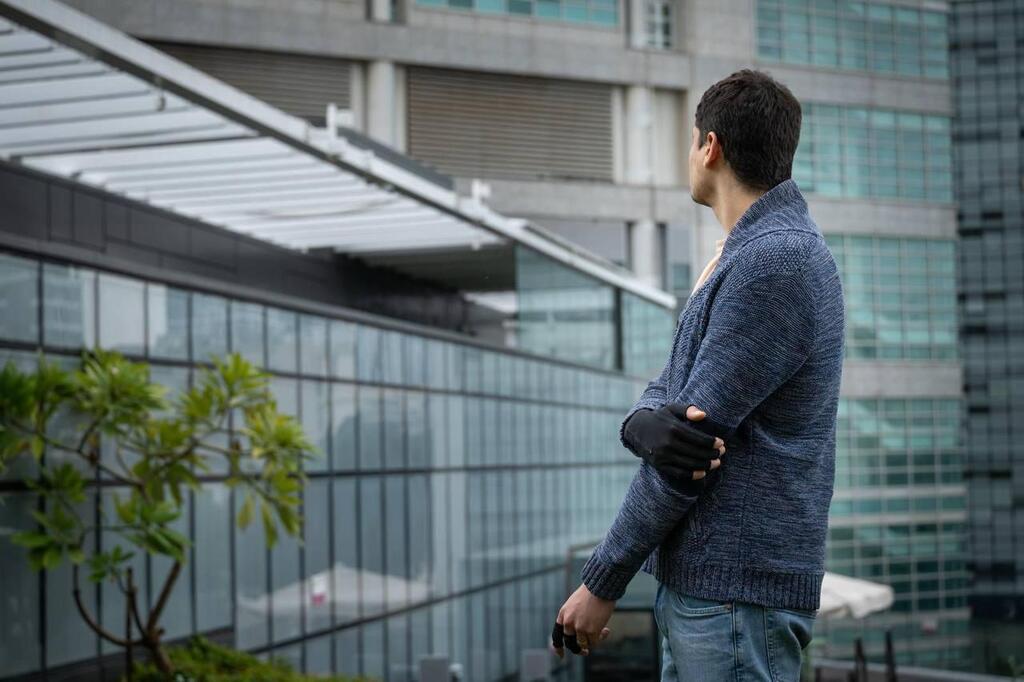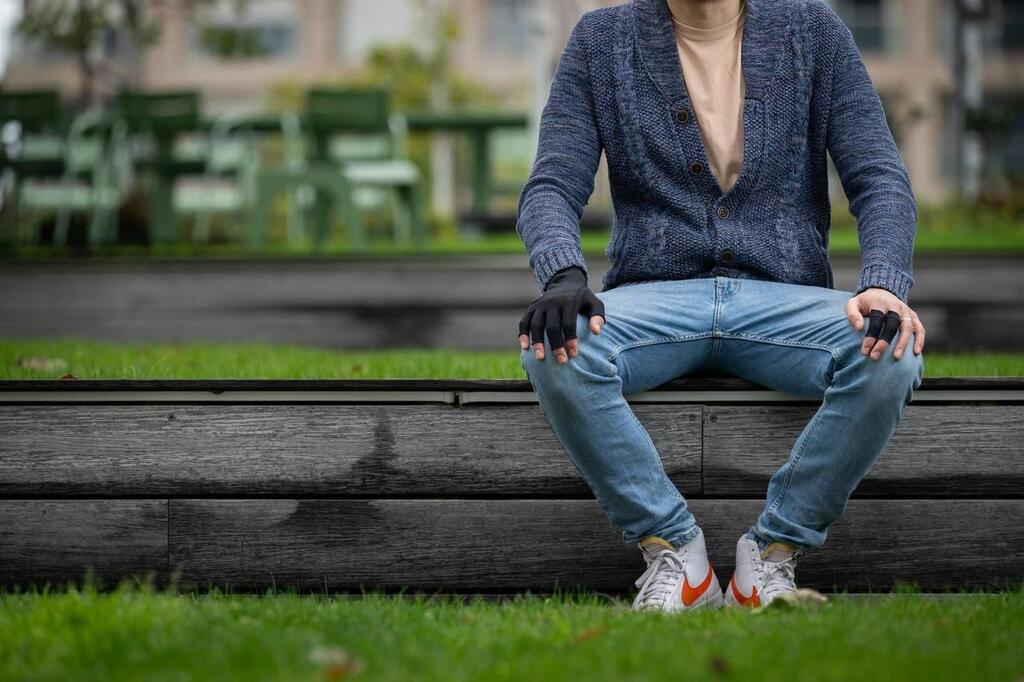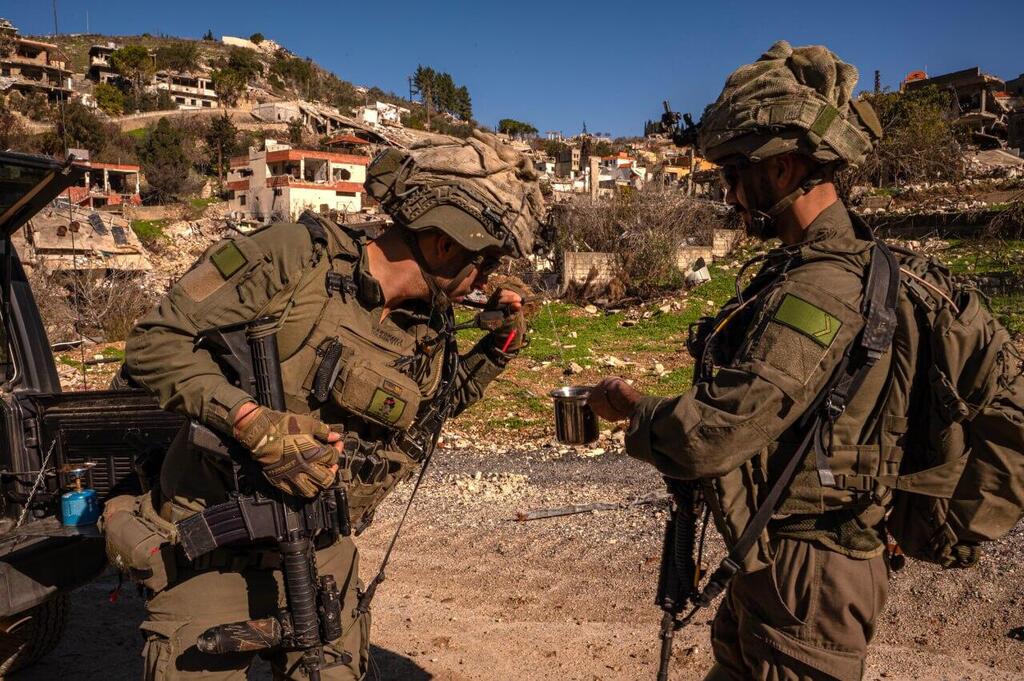“After more than ten minutes in the air, Vitaly leaned close to my ear and whispered that we were on our way to Tel Aviv, to Sourasky Medical Center. Inside, I felt the first hint of relief. My mind and emotions were deeply consumed by the event, but that whisper—Tel Aviv, Sourasky—was profoundly powerful to me. It represented a sharp transition from the harsh realities of the battlefield to the place where my greatest joy came into the world: Sourasky, the hospital where my children were born.”
There’s something magnetic about B., in the way he writes and speaks. It’s as though he carries an internal fire for action and creation—one that, not so long ago, also resonated through the strings of his beloved guitar. Today, due to his injury, he can no longer play the guitar but instead plays the piano (with remarkable skill) at Sourasky Medical Center in Tel Aviv. As part of his rehabilitation, B. decided to document his journey in what he calls his "injury journal." He explains that it’s not a form of emotional therapy but rather a personal document he plans to one day pass on to his children when they ask, "What did Dad do in the war?"
B., who was severely injured in Lebanon, sees writing his journal as a tribute to his family. “My words are heartfelt, and this journal is my way of honoring my wife and children.”
When it came time to sit down and share his story, B. hesitated. A 35-year-old Tel Aviv resident and finance manager at a high-tech company, B. wasn’t sure he wanted to talk about the heroic events in which he saved himself and another soldier from a burning shelter that was hit by a drone on October 8, near a northern border outpost. “During that moment, I stared death in the face, and it gave me a minute to think about everything. A thousand thoughts raced through my mind, but one of them was that I hadn’t left any message for my family. No words for my children to explain why Dad had been gone for so long on reserve duty, in case I didn’t make it. My family gave me the drive to survive, and now this is my way of giving back to them—by telling the story. Beyond that, it helps me in my recovery. Writing feels like a form of meditation.”
Like so many reservists in their thirties, the war upended B.’s life without warning. Since the fighting began, he has spent dozens of days on the northern border across three rounds of reserve duty. On October 7, the Hamas attack found him with his family at his parents’ home in Ma’ale Adumim. “It was my wife who woke me up and showed me that infamous image of the pickup truck in Sderot. At first, I didn’t know if it was real, but then the air raid siren went off. I ran to the synagogue to bring the kids, who were with my parents, and when I got back, the phone rang. As a sergeant in the 769th Battalion, I knew I was being called up. I quickly packed my things and drove to the meeting point.”
B. completed two full rounds in the tense north, just before the situation escalated. He received his third reserve duty call-up while on a family vacation in Thailand—a trip he had organized to briefly escape the situation. “I knew it might happen. We had been prepared for it, and when the call came, I didn’t tell my wife immediately. I waited until we were on the plane to drop that ‘bombshell.’ It wasn’t an easy conversation. We were on our way back from Thailand, and I had to tell the mother of my two children that I was returning to the hell of real war.” In his journal, B. describes the moment like this: “I felt a strange mix of excitement and dread about entering Lebanon.”
B. arrived at the northern base immediately after Rosh Hashanah. Three days later, he sustained a severe injury. “I suppose it was the quickest way to get back to Tel Aviv,” he jokes, his dark humor surfacing as he recalls the incident. “I didn’t plan for this to happen. In fact, I was thrilled at the prospect of entering Lebanon. There was this internal excitement mixed with pride. Even when I was in Thailand and heard about what the country had done to Hezbollah, I felt proud—proud of our ability to return to high levels of cunning and strategy. I wanted to be there, to be part of it.”
On the morning of October 8, 2024, exactly one year and one day after the war began, B. was severely wounded at a base near the Lebanese border. “It was the quietest morning we’d had. I woke up at five to help secure some forces. By seven, I looked at the sky and thought to myself how wonderful it was to hear that silence. I was in the operations room when it all began. Out of nowhere, drones started falling on the base. I ran to the shelter to prepare equipment with another soldier, and suddenly, a drone hit one of the base’s structures near the shelter, causing a massive explosion.”
The blast trapped B. and the other soldier inside the shelter, which caught fire. “Flames and smoke created a wall, and we knew no one could come in to rescue us. The heat was unbearable, and we couldn’t even see the short distance to the door. Outside, I could hear shouting and bullets whizzing by. Later, I learned the fire had ignited the ammunition. Inside, all I knew was that we were in a major event.”
Seconds into the incident, B. realized the severity of the situation. “It was clear no one could get to us, and that this would be a painful and fiery end. We couldn’t even exchange words—the rising heat drove us to silence. At one point, I hugged my friend and told him I loved him. I hoped I’d pass out, but I couldn’t. Suddenly, my child’s face appeared in my mind. I couldn’t believe this was how it was going to end.”
Through the thick black smoke, B. spotted a ray of sunlight piercing through. Together with his friend, he decided to run through the fire to save themselves. “We just looked at each other and said, ‘Let’s run.’”
B. was the first to make contact with the flames during what became the run of his life—a mere seven meters. “We had to move obstacles out of the way, which caused burns on our hands, but I didn’t care. We made it out and reached another shelter, where I collapsed on the floor. At that moment, I realized I was in serious trouble; I couldn’t breathe. The pain in my body was excruciating, and from that point on, I could only take shallow sips of air until I was evacuated. It was terrifying. Later, I learned I had sustained lung injuries from the blast and inhaled toxic gases.”
Get the Ynetnews app on your smartphone: Google Play: https://bit.ly/4eJ37pE | Apple App Store: https://bit.ly/3ZL7iNv
In the minutes before his evacuation, B.’s thoughts were with his daughters. “I told myself, ‘Survive for them. Don’t make things harder for the others handling the situation.’ I felt surrounded by the country’s bravest lions, and this is a good time to thank them. It’s always reassuring to know you’re in the company of lions.”
When B. arrived at the hospital, he could barely whisper due to his injuries. Yet when asked to inform his partner of his condition, he hesitated. “I thought it was too much for me to handle. I sat there for ten minutes because I couldn’t remember her number. In the end, I managed. I didn’t know what to say, but when she heard my voice, she started crying. Then I passed the phone to the casualty officer.”
Weeks later, B. decided to take on the task of writing his injury journal. It serves as both a record of what he endured over the past year and a half and as part of his occupational therapy to rehabilitate his hands, which suffered severe burns. “I write at least three or four times a week. At first, because of the pain, I could only write for a few minutes at a time. I’d write, then rest, and then write again. Over time, I’ve been able to extend those periods. Now, I can sometimes write for half an hour or even an hour.”
So far, B. has documented everything leading up to his injury. He plans to continue writing about his hospitalization—when he wasn’t sure he’d survive—and his rehabilitation. He approaches the process with minimal self-censorship and takes pride in his progress.
“My words are heartfelt and unfiltered. There are things I don’t want to remember, so they don’t make it in. My focus is on my children and what I want them to read someday. I want them to know what we endured as a family during this war—what all reservist families endured, whether injured or not. Writing helps me with my hands, and I’ve even started drawing to improve my dexterity. I’ve returned to playing the piano. Above all, I want to return to reserve duty. It has to be something that suits my limitations, but I want to keep contributing. I was an integral part of Israel’s security, and I want to continue being one.”





